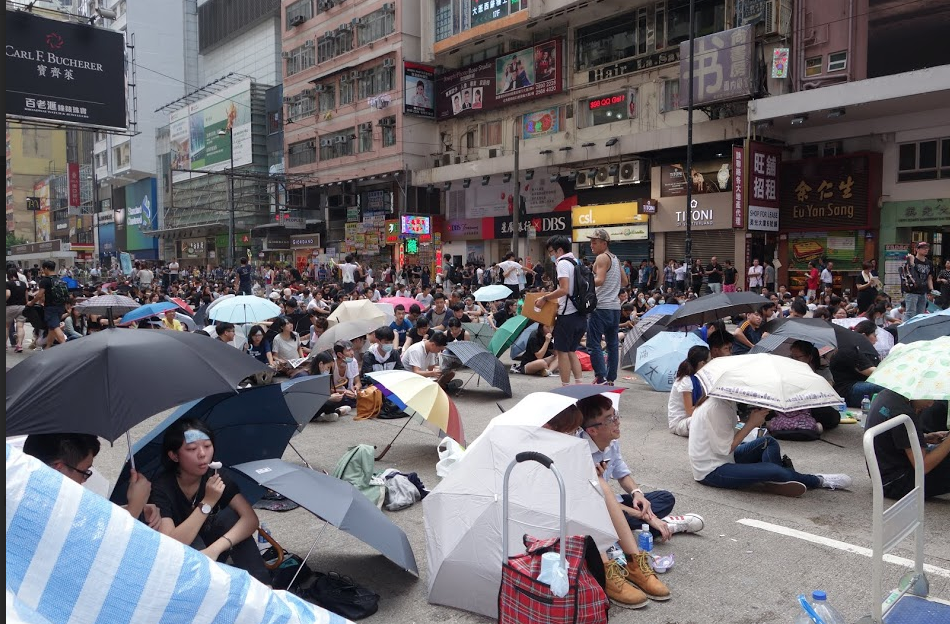HONG KONG – Pro-democracy demonstrations continue into the fourth day in Hong Kong, despite a police crackdown on Saturday.
As riot police indiscriminately peppersprayed and fired 87 rounds of teargas at 60,000 peaceful, unarmed demonstrators, the protestors used umbrellas to shield themselves from the onslaught. Hong Kong police were condemned by human rights organizations including Amnesty International for using “unnecessary” and “illegitimate” force against peaceful demonstrators, while Social media dubbed the demonstrations the “Umbrella Movement” or “Umbrella Revolution.”
Foreign Affairs Minister John Baird said on Twitter that the “aspirations of people of Hong Kong are clear” and that “Canada supports continued freedom of speech and prosperity under the rule of law.”
New Democratic Party MP Paul Dewar urged the Canadian Government to support Hong Kong people’s right to peaceful demonstration and the Chinese Government to “exercise restraint during this period.”
Although Hong Kong police and Chief Secretary Carrie Lam defended the use of tear gas, police tactics have apparently softened after the controversial use of force backfired and drew tens of thousands more angry demonstrators to the streets. Protesters have now paralyzed the main roads in the territory’s main financial centres and popular shopping areas on both sides of the harbour. Student leaders have called for an indefinite strike since.
While young people seem to dominate the crowds during the day, as evening approached more people joined the demonstrations. Supply stations have been flooded with water, food and other donations.
Volunteers, mostly students, are seen everywhere offering supplies to protesters, many of whom decline in consideration of others who might need them. A student volunteer of the Hong Kong Academy for Performing Arts said she did not know any organisers, but offered to help after the supply station near where she sat asked for volunteers.
“Most of the volunteers don’t belong to any groups but we are helping out because we believe that’s how a strong civil society is built.”
Although leaderless in daily operations, the self-initiated movement was spearheaded by student leaders, opposition politicians and Occupy Central with Love and Peace, a direct action group, in making decisions and negotiating with the Leung Chun-ying administration.
The coalition demands that Beijing withdraw the electoral reform plan that rejects “genuine democracy” in Hong Kong and that the Hong Kong government re-submit a new political reform report to Beijing.
Among the protesters are Hong Kong-Canadian citizens. May Wong, a social worker who moved to Toronto 23 years ago, has attended the protest every day since Friday.
“Having lived in a democracy, I believe the people of my hometown should fight for their democratic rights and defend the rule of law. I have been telling my Chinese friends in Toronto about what is happening on the ground because they have only heard about the Saturday clashes in the media. Most of them do not understand or sympathize with the young protesters in Hong Kong.”
Others voice support for Hong Kong from abroad. On Tuesday evening, the Vancouver Society in Support of Democratic Movement held a vigil outside the Chinese Consulate, while a group of students gathered outside the British Consul-General in Vancouver to pressure the two signatories of the 1984 Joint Declaration that promised Hong Kong a high degree of autonomy.
On Sunday, demonstrators gathered in front of Hong Kong Economic and Trade Office and the Chinese Consulate in Toronto. Organizers call upon Canada to urge the Hong Kong government to implement “a truly meaningful universal suffrage” in Hong Kong.
In Calgary on Sunday, 30 people protested with placards to condemn Beijing’s decision.
There will be rallies in Toronto and Halifax on October 1, according to the Global Solidarity with Hong Kong, a global coalition of groups and individuals are organizing rallies and sit-ins to support Hong Kong. At least 30 cities around the world and 45 university campuses in North America, including UBC and SFU, are hosting solidarity actions.
Ricky Chan, Toronto coordinator of the Global Solidarity group said he wants to support his hometown because of his Hongkonger identity:
“Hong Kong Canadians reach out to non-Chinese media and communities to raise awareness on the current situation in Hong Kong.”
Jason Wong, a second year Sociology student of Shue Yan University, said he is thankful for the tremendous support shown by the international community. “I think international pressure will have some impact on Beijing. It is important that the international community continues pressuring their governments to speak up against China.”
However, today CY Leung said that Beijing would not be “threatened by a few radicals” and called for a halt to the civil disobedience movement that has disrupted the economy.
Protesters criticize Leung for avoiding the real issue.
“People are here to demand their democratic rights. When Leung spoke about the ‘economy,’ he really meant the tycoons and elites. That is why people are outraged and vow to stay until the government listens to public opinion,” said a long-term resident from England who has been living in Hong Kong for 30 years.
But it is uncertain whether the public outcry in Hong Kong and around the world will pressure Beijing into withdrawing the electoral plan.
Angela Wong, who is part of the Nursing Department at Hong Kong Polytechnic University, expressed a sentiment shared by many protesters:
“I am not hopeful about the situation, but at least I have stood up and made my voice heard. If we don’t defend our home and dignity now, we might never be able to do it again.”
Ellie Ng is a recent graduate of Middlebury College currently based in Hong Kong.
Photo: Raewadee Parnmukh



